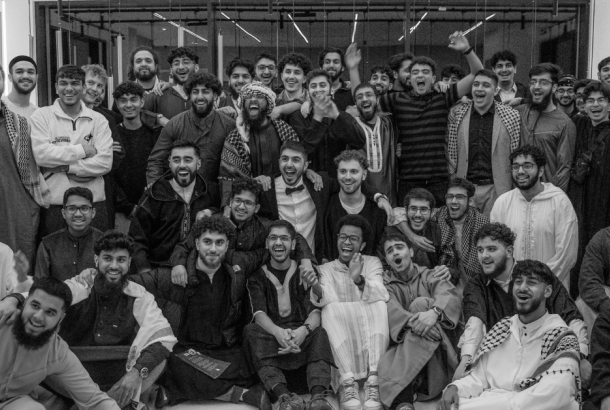“I was barely aware of my own feelings”: Fleeing China’s reign over freedom and thought
By wilfbutler

A small white book sits on Emma Chen’s kitchen table. It’s called Yorkshire Dialects and gives the reader a breakdown of just about any word a Yorkshire local might throw at you. One might not expect it to be the most enticing read for a young international student from China, but Emma says she’s devouring it. I point to “chuffed”. She doesn’t know it. “To be happy about something,” I explain. She keeps repeating the word to herself, trying to sound more and more like a native.
Being chuffed – happy – is something Emma thinks a lot about at the moment. Since leaving her native China and moving to Manchester, to study for her Master, Emma has come to question her experiences of growing up in China. After three long, hard years of living through a pandemic, moving to Manchester was like ripping off a plaster, and being exposed to new freedoms has had a huge impact.
Emma’s memories of her childhood are mostly happy. “Compared to other children, it was pretty good.” But it doesn’t take long for her to begin describing an upbringing of immense stress.
She talks about the pressure placed on young people in school particularly. “They don’t consider individual happiness. It’s never a priority.” Emma tells me she was a talented athlete, and because of this, she was able to go to a particularly prestigious high school. “But that wasn’t because of my academic performance, [so I] could never catch up.”
Competition and anxiety run through the veins of the young Chinese. With youth unemployment rising in China, and a tight number of university places available amongst a staggering population, it’s not surprising young people feel burned out.
The early age intense competition became a regular feature in Emma’s life. She remembers being in primary school, from age six or seven, being forced to compare themselves with classmates in exams, and feeling humiliated when underperforming. “They would often say you’re not good enough, or you need to learn from others.” This worsened in middle school, where a ranking system was introduced. “Each exam, you got ranked in your year. Can you imagine? You’ve got a thousand people being ranked,” she pauses. “It gives you so much stress.”
“I always had this feeling, and now I’ve learnt more and since I’ve been here, I’ve realised I was depressed.”
How low did she get, and did these emotions become a central part of her youth? She doesn’t hold back. “Well, the first time I wanted to kill myself was in the second year of high school.” She says it grinning, letting out a slight giggle even. It’s clearly not that she finds it funny, but she does demonstrate how misery has become as common in Chinese schools as the books and pens inside them.
Talking about these issues was never really an option. Everyone in China, she explains, is told to think about the well-being of the collective, forcing people to disregard their personal feelings and well-being. She quickly spits out a Chinese quote she seems familiar with. She tries to translate it for me: “When your benefit has a conflict with the country, the country is always the priority.” Effectively, she’s always been told to keep quiet.
The theme of keeping quiet is a common one in our discussion. China, she tells me, is a breeding ground for secrets. A place where being told to acquiesce is the norm, and being encouraged to think critically is unimaginable. “It’s not that we’re not allowed to ask questions, but when I ask a question that’s ‘weird’, just any question that’s asking why, they will say ‘Just stop talking. Stop asking’.”
It felt natural, then, for Emma to have wanted to get out of China. Aged 14, she went on a school trip to the United States, and later her father gave her the opportunity to go to Canada. “He always wanted me to explore and have a broader view of the world,” Emma explains. This gave her the appetite to explore the outside world. That’s certainly not the experience of all Chinese people living abroad, she says. “Some of my Chinese friends really want to go back to China. Sometimes that makes me feel isolated by my culture, ” she adds.
If not all Chinese students abroad feel the same as her, what then has she experienced that’s different?
“In China, I was barely aware of my own feelings, but here I pay more attention to them. Now I know how I feel about different things”.
Other Chinese students however have a strong link to their families back home. The need to prioritise the collective’s well-being has made them feel almost guilty for being so far away. Referring to wanting to find her own happiness, Emma is sure freedom of thought and emotion wouldn’t be accepted in China. “It would definitely be considered selfish… I’m just more rebellious,” she says.
There are more appealing elements of Chinese society. One culture shock she’s experienced in Manchester is not being able to walk home alone at night. In China, it’s normal for women to be out alone and feel very safe. Assault or muggings are rarities.
Open access to information has played a role in making Emma analyse her home country from a new perspective; friends have exposed her to new materials. “When I came here, I didn’t know how to get information. A friend asked me a question about an issue, and then gave me resources. I read it, I read a paper, I watch the news. In China, we barely do that.”’
Emma is open and comfortable talking about mental health in China but becomes more shut off when asked about learning about China since living in Manchester. “I don’t want to talk about the history, I don’t want to talk about that.”
Perhaps she’s discovered things that feel too raw to discuss. Or perhaps she gets asked this sort of thing all the time – I can’t be sure. One clear thing is she’s very aware of the lack of free information in China. “Some history has been deleted, or the chapter exists in the textbook but the teacher only mentions it briefly and then we skip it.”
When I sit down with Emma for this interview, we eat a hot pot that she’s prepared. It’s a classic of Chinese cuisine. Mountains of Chinese cabbage, tofu and noodles sit next to a jacuzzi of spicy broth bubbling away. We talk about future plans as I attempt to dig my chopsticks into whatever I can. After finishing her master’s, Emma hopes to stay in the UK and become a Mandarin teacher. Many parts of China will, for the better, stay with Emma forever. Despite some painful, even disturbing tales Emma shares, her spirits are high. Life in Manchester seems to suit her well.
She seems pretty chuffed.
Names have been changed in this article.







